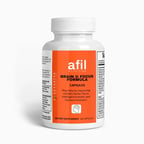Iodine
Iodine deficiency can lead to thyroid imbalances, fatigue, and impaired cognitive function. Ensuring adequate iodine intake through diet or supplements is crucial for maintaining thyroid health and overall well-being.
🌼 What is Iodine?
Iodine is a trace mineral essential for thyroid function and metabolism. It supports hormone production that regulates energy, growth, and brain development. Iodine is found in iodized salt, seafood, dairy, and certain plant foods.
🤔 Why Do I Have a Deficiency in Iodine?
Iodine deficiency can occur due to various factors, including:
-
Inadequate dietary intake: Lack of iodine-rich foods in the diet, especially in areas where the soil is iodine-deficient.
-
Poor absorption: Digestive issues or conditions affecting nutrient absorption can reduce iodine uptake.
-
Increased iodine needs: Pregnancy, breastfeeding, or certain health conditions may increase iodine requirements.
-
Goitrogens: Some foods like soy, cabbage, and broccoli can interfere with iodine absorption when consumed in excess.
Ensuring sufficient iodine intake through diet or supplements can help prevent deficiency.
🛠️ What Can I Do About It?
To address iodine deficiency, you can:
-
🥗 Increase iodine-rich foods: Include seaweed, iodized salt, dairy, eggs, fish, and shellfish in your diet.
-
💊 Consider iodine supplements: If necessary, supplements can help restore iodine levels, but it’s important to monitor dosage to avoid excess.
-
💪 Improve thyroid health: Supporting your thyroid function with a balanced diet and managing stress can help optimize iodine usage.
-
🚫 Monitor goitrogens: Limit foods that interfere with iodine absorption, especially if consumed in large amounts.
Remember to balance iodine intake, as both deficiency and excess can impact thyroid health.
💊 Which Supplements Can Help with an Iodine Deficiency?
-
Iodine Supplements: Directly address iodine deficiency and support thyroid function.
-
L-Tyrosine: Works with iodine in the production of thyroid hormones.

-
Selenium + Zinc: Helps with iodine metabolism and thyroid health.

-
Vitamin A: Enhances iodine’s effectiveness in thyroid hormone synthesis.

-
Ashwagandha: Supports thyroid function and helps balance iodine levels.

🌟 Why Might I Have a Deficiency in Ashwagandha Even Though I Take Gummies Everyday?
Ashwagandha is an herb, not a nutrient your body stores like a vitamin or mineral — so a “deficiency” usually points to poor absorption, low potency, or a mismatch between form and your body’s needs. Even if you're taking gummies daily, here’s why it might not be working effectively:
-
Low Potency: Some gummies contain very small amounts of actual ashwagandha extract.
-
Poor Extract Type: KSM-66 or Sensoril are the most researched forms — others may not be as bioavailable.
-
Inconsistent Dosing: Gummies may not provide a steady or sufficient dose.
-
Digestive Issues: Poor gut health can reduce how well you absorb herbal compounds.
-
Interference from Other Ingredients: Fillers or sweeteners in gummies may interfere with absorption or cause sensitivities.
🍽️ Foods to Avoid with an Ashwagandha Deficiency
-
Excess sugar – Can spike cortisol and counteract ashwagandha’s calming effect
-
Highly processed foods – May promote inflammation and stress
-
Too much caffeine – Can override its adaptogenic benefits
-
Alcohol – May disrupt hormone balance and liver detox pathways
-
Refined carbs – Can throw off blood sugar, adding more internal stress
🍽️ Foods That Support an Ashwagandha Deficiency
-
Healthy fats – Avocados, olive oil, nuts, and seeds help with absorption
-
Adaptogen-friendly herbs – Like turmeric and ginger, which complement ashwagandha’s effects
-
Magnesium-rich foods – Such as leafy greens, bananas, and pumpkin seeds for stress support
-
Protein-rich foods – Eggs, lentils, and lean meats help stabilize energy and hormone function
-
Fermented foods – Yogurt, kimchi, sauerkraut support gut health, which may enhance adaptogen effectiveness
.png?width=100&height=75&name=AFIL%20Logo%20(1).png)